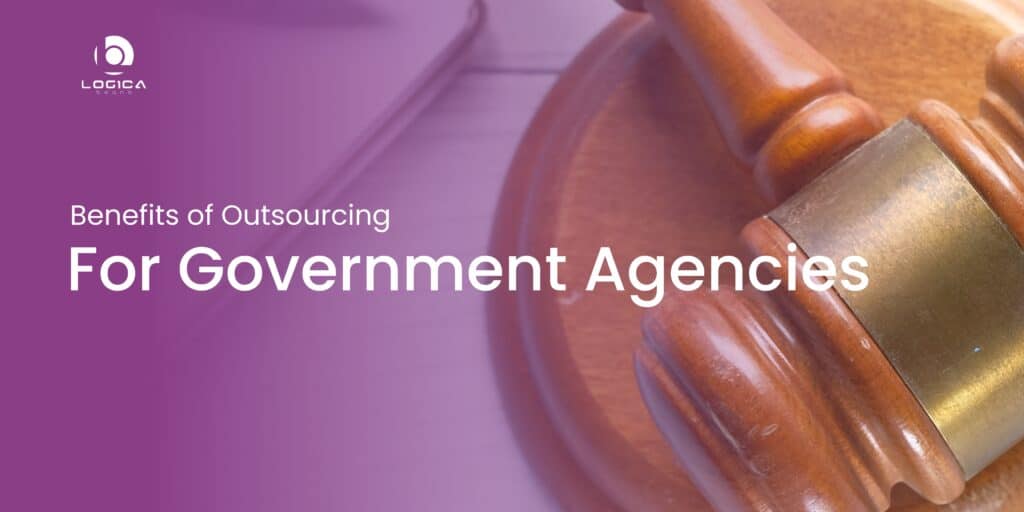Governments nowadays are attempting to accomplish more with less, therefore agencies aiming to increase productivity and save expenses are finding outsourcing to be an increasingly appealing choice. Government organizations can leverage the specialized knowledge of a third-party supplier by outsourcing specific tasks, freeing up precious resources that can be employed for other purposes. But what specific advantages does outsourcing offer to government organizations?
Inside this blog, you will get to know more about various benefits of outsourcing for government agencies and how it can enhance services and operations. Learn why more and more government agencies are turning to outsourcing as a means of achieving their objectives, from cost savings to enhanced efficiency.
Outsourcing for government agencies
As the world continues to evolve and become more complex, government agencies are facing increasing pressure to reduce costs and improve efficiency. One solution that has become increasingly popular in recent years is outsourcing, where a government agency hires a third-party contractor to perform tasks that would otherwise be performed by government employees.
Government agencies can also contract outsource certain tasks and services as they follow specific rules. Although there are numerous benefits of outsourcing for government agencies, staff must be cautious to maintain security and compliance. The key to effective and secure outsourcing for government agencies is selecting the best vendor and adhering to industry best practices.
Typically, outsourcing for government agencies are done for non-core tasks like customer service, IT support, data management, building and construction, garbage disposal, food service, pension management, and similar tasks while keeping key tasks like law enforcement, tax collecting, fire safety, and military operations. When outsourcing for government agencies are done properly, outsourcing offers organizations a host of advantages that may boost productivity and save costs.
What services can be outsourced for government services?
There are many services that can be outsourced by government agencies. Some of the most commonly outsourced services include:
● Accounting and financial management
Outsourcing of accounting and financial management services can help government agencies by providing access to specialized expertise and technology, improving efficiency, and reducing costs. Outsourcing company can provide more cost-effective and up-to-date financial management systems and processes, as well as support in areas such as budget preparation, financial reporting, and auditing.
● Human Resource
Outsourcing human resources services can help government agencies by providing access to specialized expertise and technology, improving efficiency, and reducing costs. Outsourcing company can provide support in areas such as recruitment, benefits administration, employee relations, and compliance with labor laws.
● Payroll
Outsourcing payroll services can help government agencies by providing access to specialized expertise and technology, improving efficiency, and reducing costs. Outsourcing companies can provide support in areas such as payroll processing, tax compliance, and benefits administration.
● Procurement
Outsourcing procurement services can help government agencies by providing access to specialized expertise and technology, improving efficiency, and reducing costs. Outsourcing companies can provide support in areas such as sourcing, contract administration, and supplier management.
● Legal services
Outsourcing legal services can provide government agencies with access to specialized expertise and resources that they might not have in-house. This can help agencies to manage legal matters more efficiently and effectively, and reduce the risk of legal disputes. By outsourcing legal services, agencies can access a wider pool of talent and resources, and
Benefits of outsourcing for government agencies
One of the main reasons why government agencies outsource is to save money. When done correctly, outsourcing can help government agencies reduce their overall costs by 20-30%. While cost savings can be a significant benefit of outsourcing for government agencies, it is important to keep in mind that outsourcing is not always the most cost-effective solution.
In some cases, the costs associated with outsourcing, such as contractor fees and oversight costs, may offset any potential cost savings. It is important for government agencies to carefully consider the potential costs and benefits of outsourcing and to perform a cost-benefit analysis before making a decision.
Improved quality is one of the potential benefits of outsourcing for government agencies, as contractors may have specialized skills, technology, and processes that can improve the quality of services provided. The quality of services provided by outsourcing company depends on factors such as the qualifications and experience of the company.
When outsourcing for government agencies, government agencies get access to new technologies which helps the agencies to keep up with the latest trends and technologies without having to make a large investment themselves. To ensure that access to new technologies is realized through outsourcing, government agencies should carefully consider the scope of services to be outsourced, the qualifications and experience of contractors, and establish clear performance metrics and oversight mechanisms.
Flexibility is another crucial thing which government agencies get when outsourcing for government agencies is done. It allows government agencies to respond quickly to changes in demand or budget without having to make major changes themselves. The level of flexibility provided by outsourcing depends on the scope of services outsourced, the qualifications and experience of contractors, and the terms of the outsourcing agreement.
Steps to effectively outsourcing for government agencies
Government agencies can get benefits from outsourcing in many ways, but how can they ensure that their outsourcing is successful? Here are four tips:
● Defining the scope of project
Defining the scope of the project is a crucial step in outsourcing, as it helps to ensure that the government agency and the contractor have a clear understanding of the project goals, deliverables, and timeline. The scope of the project should include a detailed description of the services to be provided, the expected outcomes, any constraints or limitations, and the timeline for completion.
Having a clear scope of the project will help to ensure that the contractor can provide accurate cost estimates, and will also provide a basis for measuring the success of the project and evaluating the performance of the contractor. By defining the scope of the project, the government agency can ensure that the outsourcing project is aligned with its goals and objectives, and that the end result meets its needs and expectations.
● Research potential outsourcing company
Researching potential outsourcing company is a critical step in outsourcing, as it helps the government agency determine which company is best suited for the project. The agency should evaluate a range of factors when choosing a contractor, including their experience in similar projects, their technical capability and resources, their reputation and references, their financial stability, and their proposed approach to the project.
The agency should also consider the outsourcing price, but it should not be the only factor considered. Other factors such as quality of work, responsiveness, and professionalism should also be taken into account. The agency may want to request proposals from several contractors, conduct site visits, and conduct reference checks to ensure that it selects the best contractor for the project.
● Getting quotes from multiple outsourcing company
Getting quotes from multiple outsourcing company is an important step in outsourcing, as it allows the government agency to compare prices and services offered by different contractors. This helps the agency determine the best value for money, and select the contractor that offers the best combination of cost, quality, and service.
The agency should provide each outsourcing company with a clear and detailed scope of the project, so that they can provide accurate quotes. Once the quotes are received, the agency should carefully evaluate each one, considering factors such as the cost, the services offered, the experience of the contractor, and the terms and conditions of the proposed agreement.
The agency may also want to negotiate with contractors to improve the terms of the agreement, or to secure better pricing. By getting quotes from multiple outsourcing company, the government agency can increase competition and improve the value it gets from outsourcing.
● Negotiating terms and conditions
Negotiating terms and conditions with the chosen company is a crucial step while outsourcing for government agencies, as it helps to establish a clear and mutually-agreed upon understanding between the government agency and the outsourcing partner. But before negotiating it is important to learn how to negotiate and manage the outsourcing contracts. The negotiation process should include a discussion of the project scope, the services to be provided, the timeline, and the payment schedule.
The government agency should also negotiate any warranties, guarantees, or performance standards that it requires, and ensure that these are included in the agreement. The negotiation process should also cover the roles and responsibilities of each party, and any penalties or consequences for non-compliance. By negotiating the terms and conditions, the government agency can ensure that both parties have a clear understanding of their obligations and responsibilities, and that the outsourcing project is aligned with the agency’s goals and objectives.
Conclusion
Outsourcing can be a good idea for government agencies when done strategically and effectively. It allows them to access specialized expertise and resources, reduce costs, and improve efficiency and focus on core competencies. However, it’s also important to consider potential risks such as loss of control, reduced accountability, and negative impact on public perception.










